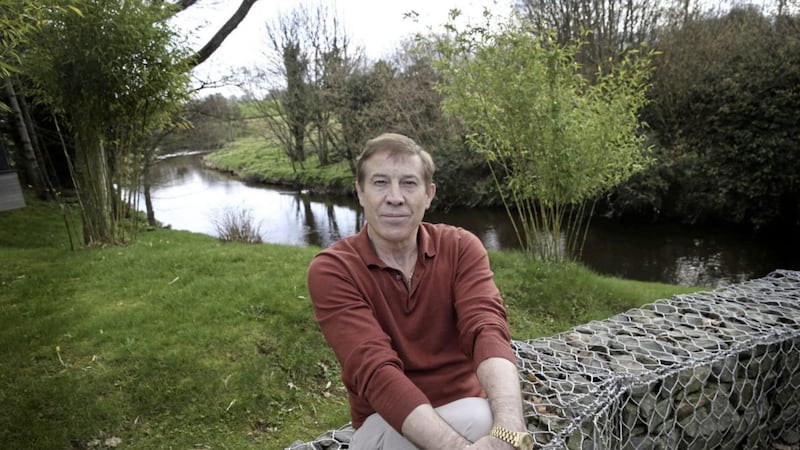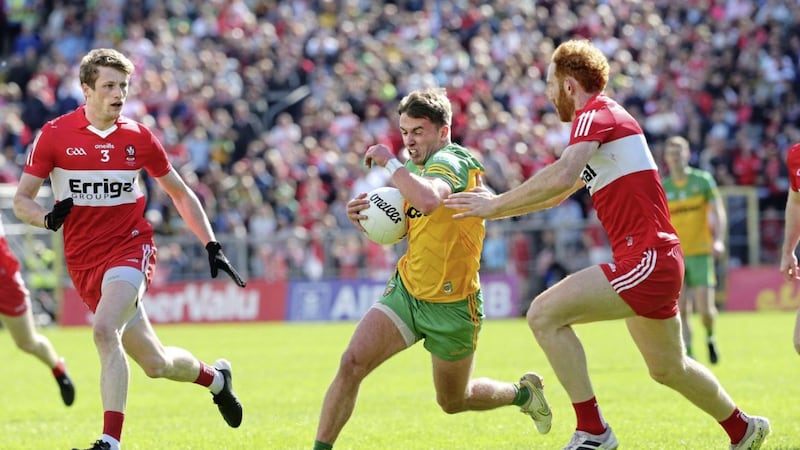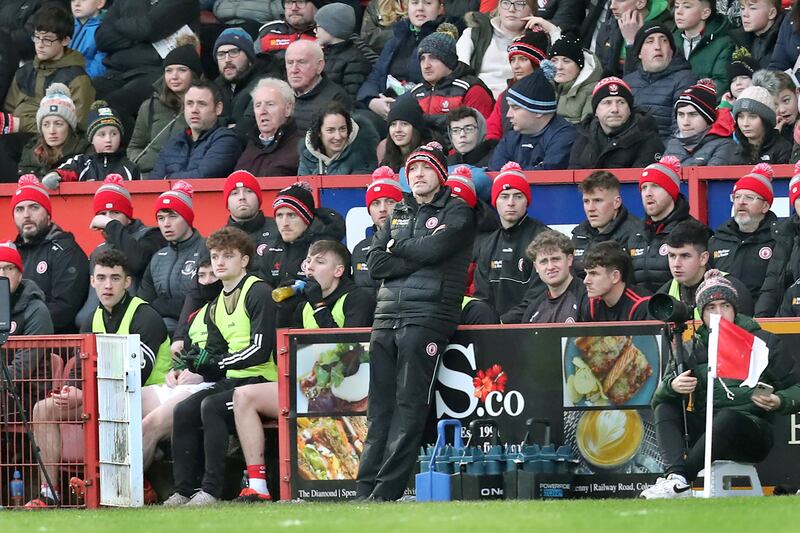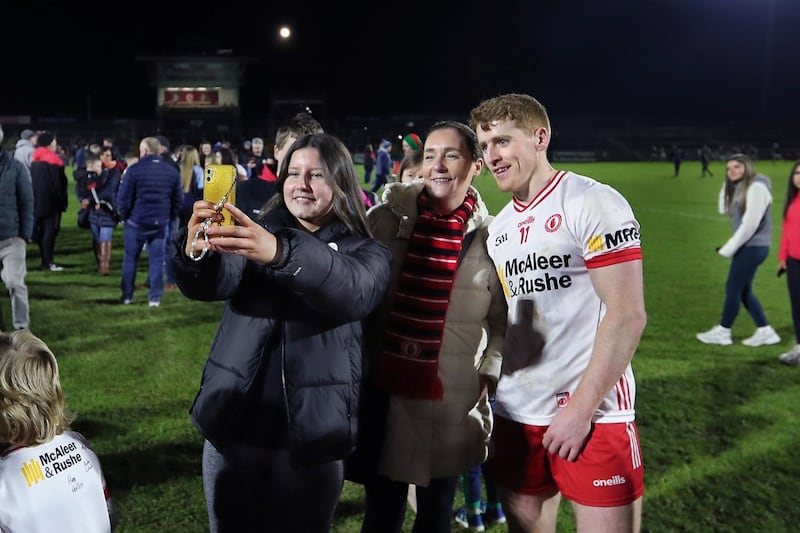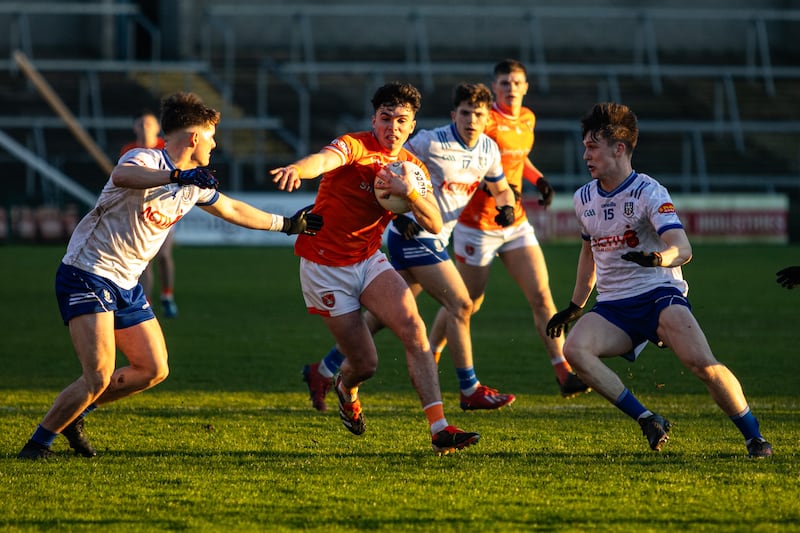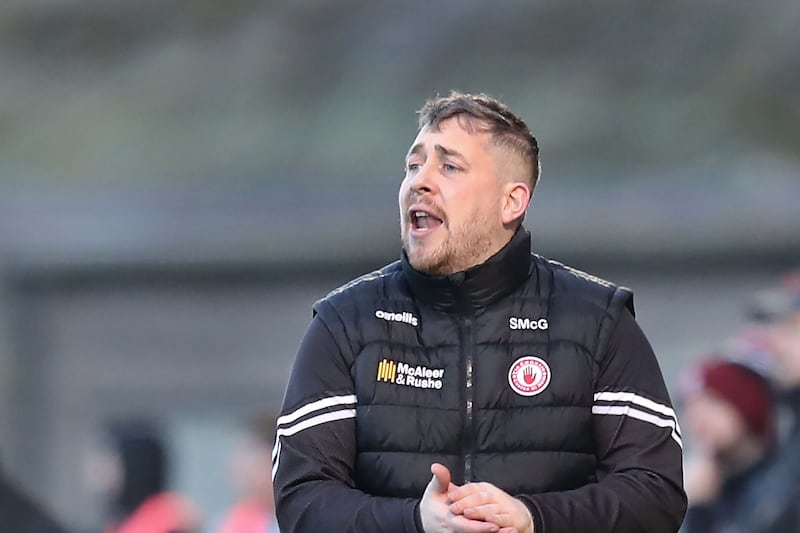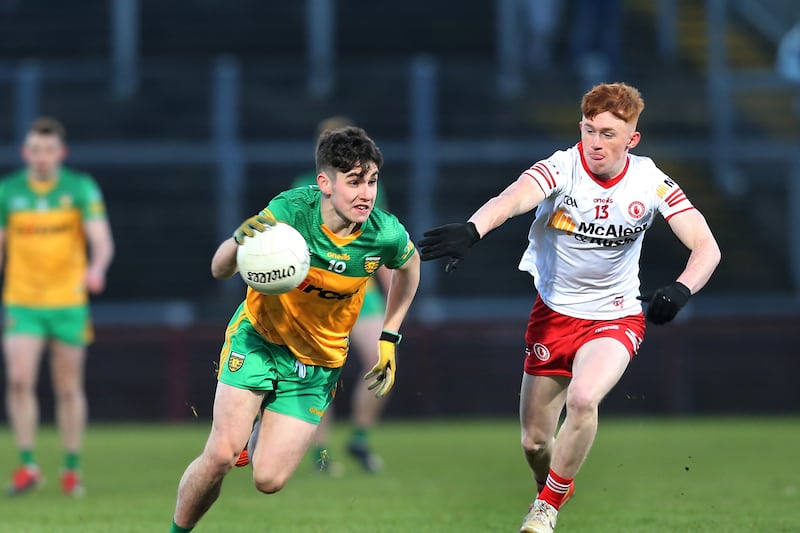HIS first car was a battered old Vauxhall Viva and Kevin McCabe remembers the colour: “Two-tone: Dirt and rust”.
He drove it down to Dublin one night in late 1980 but instead of using the carpark at the Burlington Hotel he pulled in a few streets away and, sporting a brand new black moustache and with his glad-rags on, he walked the rest of the way.
After a banquet dinner, he did something no Tyrone footballer had done before – he accepted an Allstar.
The lad from Clonoe (he drives a Lamborghini Urus jeep now and we’ll get to that later) was named in the team at right half-back. He had come a long way and had much further still to go.
Tall, quick, two-footed and up for the game “morning, noon and night”, he followed his father Felix into the O’Rahilly’s senior team aged just 15.
Two years after that debut against Eglish he played centre half-back for Tyrone in the 1975 All-Ireland minor final against Kerry. Art McRory cut his managerial teeth with that side and when he moved on to take over as senior manager, McCabe followed him up the ladder and captained the team in the 1980 Ulster final, the county’s first since 1973.
A remarkable game finished 4-12 to 4-9 in favour of Armagh but there were better days ahead for Tyrone and McCabe. And plenty of them.
These pages barely do justice to a career that spanned 23 seasons with his club (minus one with Skryne in Meath where he won a league and championship alongside Colm O’Rourke) yielding four intermediate titles and a prized senior championship medal in 1991.
With Tyrone he played in All-Ireland finals at minor and senior level and six Ulster deciders too. Then there were campaigns with Ulster in the Railway Cup, the University of Ulster (he decided to go there instead of Queen’s after reading an advert for an accountancy course on the back page of The Irish News) and with trans-Atlantic Tyrone he won three New York championships.
Oh, and two seasons with Portadown in the Irish League in the early 1980s when he played as a striker and finished as top-scorer.
He lost a few along the way too. 1988 was the year of ‘two-point defeats’. He lost the Tyrone Intermediate final (“I scored 4-21 in three games and never scored in the final – I played well but just didn’t score”), the Ulster final, the New York Championship final and the Railway Cup final all by the same two-point margin.
But let’s concentrate on the good times.
He was studying for professional accountancy exams in Ballsbridge and playing his football for Skryne when McCrory rang to let him know he was an Allstar.
“It’s something special when you’re the first I suppose,” he says.
“In those days the Railway Cup was a big thing and Ulster won it. I marked (Pat) Spillane and he scored a point and I scored a point. I was Tyrone captain and we got to the Ulster final and I’d scored a few points along the way from half-back.
“But I wasn’t expecting it. I was living outside Navan and big Art rang to let me know… It was one of those things that took a few days to sink in.”
He discovered America on the Allstars trip that followed and got to know some of the GAA diaspora on the east coast. He spent a summer in Philly and flying to New York for the weekend to play a game of football became, if not common, certainly regular.
It was a surprise that he swapped the red and white of Tyrone for the red of Portadown for two seasons. He’d played for Moore Swifts in Coalisland “to keep fit” and, after scoring five goals in a Mid-Ulster League game, heard the Ports were interested in signing him.
He decided to give it a go and it’s typical of him that he refused to allow sectarian barriers get in the way of what he wanted to do and he hit the ground running with two goals on debut against Crusaders.
"I would never change it,” he says. “I had a very enjoyable time.”
But by 1984 he was back with his county and driving the Red Hands to their Ulster breakthrough. In that year’s Ulster decider, the famous (or infamous, depending on which side of the Blackwater you live on) ‘McGuigan final’, McCabe’s good friend Frank left Armagh bewildered with 11 superb points.
Ardboe maestro McGuigan managed four more in the All-Ireland semi-final that followed but Tyrone, who were caught in the Croke Park headlights, were mauled by Dublin.
“It was unreal that day,” says McCabe.
“It was mind-blowing – the noise coming from the stands... I was shouting at the man five yards away and he wouldn’t hear me. I found it so strange, there was so much noise coming down onto the pitch. The Dublin boys would have played in Croke Park more times in one season than we had played in our careers.”
With their banners flying low, they headed northwards beaten but as ambitious Tyrone teams do, they licked their wounds, gave some thought to where they’d gone wrong and vowed to be better next time. And they were.
Two years later, the Red Hands beat Down to clinch Ulster again and then set their minds on winning an All-Ireland semi-final for the first time in the county’s history.
Galway were the opposition and this time, thanks to a nerveless late penalty from McCabe (it’s an unwritten law in GAA that if you’ve played soccer you take the penalties), Tyrone progressed to the decider against four in-a-row chasing Kerry. The build-up to that game was a giddy blur of red and white bunting and screaming kids.
“Winning that first Ulster title, we felt like we had won the All-Ireland. It was unreal celebrations,” says McCabe.
“It was unbelievable – you were running around different places and visiting schools and meeting kids and signing autographs…”
Amid all the hype, Tyrone planned meticulously for Kerry. They covered everything from Spillane and Sheehy to ‘Jacko’ and Paidi and, for two-thirds of the game everything went like clockwork. But the plan did not include a chapter on what to do if they were eight points up with the end almost in sight.
The score was 1-7 to 0-4 when Tyrone were awarded a penalty and McCabe stepped up to take it at the Canal End. He hit it right-footed, sweetly enough but the ball zipped over the bar. Did he take the percentage option and go for a point?
“Nooooooo, I did not,” he answers emphatically.
“I just got underneath the ball.
“Jacko (Jack O’Shea) missed one that day too. It’s a good quiz question: ‘Who didn’t score from a penalty in the 1986 All-Ireland final?’ The answer is Jack O’Shea. I scored a point, Jacko scored nothing – he missed but people always remember mine, they forget about his.”
Mickey McClure and Stephen Rice had also managed points from goal-scoring opportunities but McCabe’s score meant that Tyrone led the reigning champions by eight. A seismic shock was in the offing… but then the wheels came off. Spillane and Sheehy ran riot and Tyrone collapsed from dominance to defeat.
“It was a lack of experience, we had no gameplan about what to do if we got so far in front,” says McCabe.
“We didn’t protect the lead, we didn’t know any better. It was the one that got away.”
But Tyrone were Ulster champions again in 1989 and their campaign began with the brutal ‘Battle of Omagh’ against Armagh. Vendettas sprang up all over the field but among it all McCabe (now playing in the full-forward line) let his football do the talking. He scored nine points as the Red Hands came back from the dead to win a thriller.
Down were edged out in the semi-final and then, after a replay, Tyrone beat Donegal in the final. McCabe, who scored two points in both games, walked down the hill for his customary pint at the Creighton Hotel in Clones (his ritual after all six Ulster finals) optimistic that the Red Hands could make their long-awaited All-Ireland breakthrough but despite a goal from Eugene McKenna, Mayo dashed their hopes at the semi-final stage.
He never got his hands on that Sam Maguire but insists: “In football I was very lucky.
“I had a great club that was always behind me and I played with the same lads the whole way through my career.
“Me, Sean Donnelly, Aidan Skelton, Ciaran McGarvey and Damien O’Hagan all came through from the Tyrone minors in 1975 and Eugene McKenna was a year older. That was the nucleus of the team and then we had John Lynch, Noel McGinn, Joe Mallon, Mickey Mallon, Harry McClure and Plunkett Donaghy in the middle of the field…
“Plunkett, Sean McNally and John Lynch all had the blond hair – the commentators got mixed-up and thought it was Plunkett all the time. I keep telling him that’s why he got all the man of the match awards!”
COUNTY Tyrone is a hotbed in two areas: One is Gaelic Football, the other is engineering. Kevin McCabe found fame in the first and made his fortune in the second.
By the late 1980s he was making a good living as an accountant but then in 1989, with his football career winding down, Powerscreen gave him with an opportunity that changed his life. He was offered the lease on a machine that weaves the heavy-duty wire mesh screens used in the quarry, sand and gravel industry (without getting too technical, a screener is an industrial defence that grind and sorts stone into various sizes).
“When football finished the business took over and work was my thing,” he says.
“The football helped me get the offer of the machine.
“I was known because I played for the county and I knew the boys. They said: ‘There’s that machine, do you want to have a go at it and we’ll be your customer?’ I didn’t know what it did but I said: ‘Yeah, I’ll try that’ and I went home and told the wife and she took a sore head because she was thinking: ‘What are we going to do now? How are we going to get this going?’
“So I had one machine and one customer (Powerscreen) when I started out.”
Now he owns nine companies in Ireland and England.
The Allied Irish Bank backed him with an overdraft and he started out in an unused, almost derelict factory. There was no roof on the building but his Clonoe clubmates “the O’Rahilly lads” mucked in and helped him sort that out and clean the place up. With a half-decent premises to work in, the only other thing he needed was someone who could actually operate the machine properly and the only local man who could do so was “this fella called Paul Harrigan from Pomeroy”.
“I couldn’t get in touch with him but then this boy walked into the factory one day.
He says: ‘I like your machine’.
I said: ‘You’re Paul Harrigan’.
He says: ‘I am’.
I said: ‘Do you want a job?’
He says: ‘I do. When do you want me to start?’
I says: ‘Now’.
“He was a very big part of getting me up-and-running, he was my first employee; me and him put the whole thing together.”
Now McCabe has around 250 people on the payroll.
He swapped his accountant’s suit and tie that for a boiler suit and over the next three years taught himself to operate a range of machines.
“The only thing I can’t do is weld,” he says.
“But I can operate every machine on the shop floor and change pumps and motors and all that sort of stuff. You learn - you have to!
“I worked all day long in the factory and then went home and did all the invoicing at night. I wouldn’t have wanted to get into this business without being an accountant first because everything revolves around money. I was able to do my own accounts and I knew what to do and what not to do.”
It is a littleknown fact that the Red Hand county is the global epicentre of an industry in which McCabe has worked hard and flourished making mesh with holes from 1mm up to 150mm.
“70 per cent of the world’s mobile screeners are made in Tyrone,” he says proudly.
“It goes back to Powerscreen and now you have Maximus, Fintech, McCluskeys… They are all our customers, they are all big, world-wide companies who send stuff all over the place. Most of the machines that they sell have our mesh on them and we make the spares as well so our stuff goes out to a lot of countries.
“Even though it’s a very specialised market, you have to keep the prices right because, if you don’t and you start trying to make too much money, somebody else will come in over the top of you.”
He wasn’t greedy but he was good and taking over England-based company Screening Systems (on St Patrick’s Day in 1995) made him a major player in the sector. Not all of his ideas worked out of course and he discovered that it can be equally important to know when to walk away from a business that isn’t working.
“I started a company in Dubai, I probably didn’t do the due diligence I should have,” he explained.
“It seemed like a good idea – I think maybe the romance of Dubai was part of it – but I closed it down 11 months later and it cost me £400,000. It (closing it) was one of the best decisions I ever made! Don’t go chasing it because it’s never going to work.
“Then I bought a company a couple of years later and it made 650 grand the first year! Some of the best decisions you make are not actually making money, they’re about saving yourself money and I never gamble with what I can’t afford to lose.”
The Covid pandemic did affect production but construction work has only been postponed not cancelled and, when society opens up again, McCabe is confident the orders for his screens will flood in.
“In our business we’ll get a good chunk of the work back again,” he said.
“The work on roads or houses or whatever it is will start again and they’ll be flat-out, working all the hours God sends and instead of us doing 12 months of screens, we’ll do the same amount in nine months.”
He’s a self-made man and a millionaire a few times over. Kevin, now 62, and his wife Bernie had five kids and grandchild number 16 is on the way. He’s semi-retired, holidays in Dubai, has a villa in Spain (world heavyweight boxing champion Anthony Joshua was a recent guest) and has a box at Old Trafford. He’s been part of Club Tyrone from its outset, set up the Kevin McCabe School of Excellence at alma mater Ulster University and has been a generous benefactor towards the Holy Trinity High School building project.
“Peter Canavan organises everybody for that,” he says.
“Canavan says: ‘Right come on ahead and sign the cheque…’ You can’t say no to God, you won’t go to heaven then!
“I said I would retire at 50 but you never retire – you need a reason to get out of bed in the morning.
“I’ve been very lucky that I’ve got some very good people working for me and the business runs without me.
“As long as you make more good decisions than you do bad ones, you have a chance but there’s always something you might have done differently.”
“Like what?” I ask.
“Like that penalty against Kerry,” he replies: “I wouldn’t mind another go at it.”
There are some things money can’t buy…
